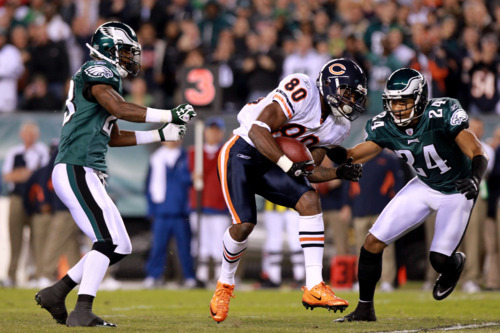
New coaches often talk about having players “buy in” to the team they are trying to build. Players have to believe that the system they are contributing to is worth personal sacrifice. They have to be accountable to their actions and understand that the play of one man affects the whole. They have to trust each other, and they have to trust their coach.
Buying in is not close to sufficient to win football games, but it does seem to be necessary. To my untrained eyes, many players have not bought in to the greater whole at NovaCare — mainly on defense.
Lets look at a test case: Dominique Rodgers-Cromartie. DRC came to Philadelphia this offseason as a young, talented player needing a home. Arizona was apparently not the right place for him, maybe this would be. But what does he see when he walks in the door?
Rodgers-Cromartie is almost immediately demoted to nickel back. He’s asked to play in the slot, a position he’s never had to handle. Who’s telling him to make this unwanted change? An offensive line coach whose promotion his new teammates have already questioned.
Not only is Rodgers-Cromartie playing a new position, but he’s doing so in an unclear system that’s fundamentally unsound in the back seven. He has linebackers next to him and safeties behind him who don’t seem up to the task and are being swapped in and out constantly, to little effect. Every linebacker and defensive back has either been benched or has had their position adjusted. And none of it has worked.
In short, Rodgers-Cromartie has about a dozen different excuses he can use to explain away his poor play and obvious lack of effort. There’s no accountability from the top, because Juan Castillo hasn’t earned that respect. There’s no accountability among the players, where the best and longest-tenured player among the secondary demonstrates a notorious I-know-best attitude — and he might be right.
We saw Sean McDermott slowly lose the players during his two year stint as coordinator. But most of the malcontents were fringe players like Chris Clemons. Quintin Mikell and Stewart Bradley, who may not have always been the best players on the field, were leaders in the locker room who publicly and consistently bought in to the message from above.
The Eagles let go of veteran players that could establish continuity and trust in the locker room. They brought in a host of new, highly compensated free agents from different systems. They promoted a coach whose strategies and solutions were suspect, at best. And then they started losing.
I keep repeating that this team has many problems, but is still more talented than the one that won 10 games last year. It’s true. The whole is much less than the sum of its parts. Until that attitude is fixed, it doesn’t matter whether it’s Rodgers-Cromartie or Jamar Chaney missing a tackle. Nothing will change.
Photo from Getty.